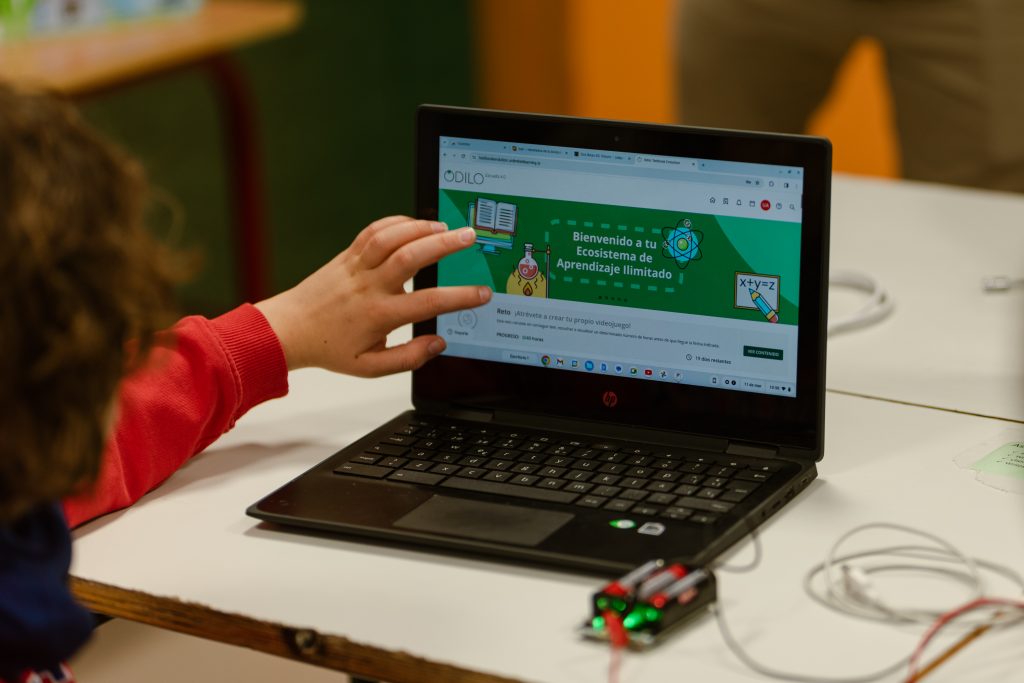Categories:
Madrid, June 26, 2024, Last year, 20% of job offers related to AI and data were not filled due to a lack of qualifications. This is reflected in the ‘Diagnosis of Talent in Data and Artificial Intelligence in Spain’ by IndesIA. This report highlights the need for our country to advance in developing digital skills.
To respond to this challenge, initiatives such as Código Escuela 4.0, promoted by the Ministry of Education and Vocational Training in collaboration with the Autonomous Communities, undertake different projects. This includes integrating the classroom’s programming, robotics, and computational thinking elements. The first step is to allow students to acquire these skills and be prepared to face the digital challenge and the high labor demand in this field.
In addition, the program includes measures regarding the supply of robotics material, training, and support in schools to awaken interest in robotics and computational thinking. It also promotes STEM disciplines (Science, Technology, Engineering, and Mathematics) among students in the 2nd cycle of kindergarten, primary, and secondary school. A challenge that ODILO, a Spanish edtech that allows all types of organizations and institutions to create their own Unlimited Learning Ecosystem, has joined by identifying the keys to accelerating digital education:
- Computational thinking: Knowing about computational thinking involves a range of skills such as problem-solving, evaluating options, and using logical reasoning. These skills are essential in computer science and various disciplines such as technology, engineering, mathematics or science. Introducing children to computational thinking early is crucial to develop their ability to approach problems logically and efficiently. It also enhances critical thinking, a valuable skill in any area of knowledge, from science to robotics. Students can develop effective strategies for finding solutions and improve their reasoning ability by learning to break down complex issues into more manageable parts.
- Programming: Programming is a fundamental tool for data analytics or cybersecurity careers and teaches essential life skills. Through programming, young people learn that concerns have multiple solutions and that making mistakes is a natural part of the learning and improvement process. This approach helps develop resilience and the ability to solve problems creatively. In addition, knowing how to program fosters skills such as attention to detail, structured thinking, and patience, which are useful in any field of study or career.
- Digital literacy: Digital literacy involves not only having technical skills, but also understanding the risks associated with using digital technologies and knowing how to use them responsibly and safely. Students must know how to navigate the Internet and other networks effectively and safely. Good digital literacy ensures that students can access information correctly, evaluate the integrity of sources, and use digital tools productively. This includes everything from using search engines and educational platforms to understanding online safety and digital privacy.
- Robotics: The implementation of robotics is becoming one of the latest trends in sectors as diverse as industry, logistics and transportation, agriculture or medicine, and health. Implementing robotics skills in education can significantly advantage students in the job market. In addition, robotics teaches technical skills and fosters soft skills such as logical and critical thinking, creativity, and collaboration. Working with robots allows students to experiment with hands-on solutions to real problems, promoting a project-based, problem-solving approach to learning.
- Teacher training: Ongoing teacher training in digital skills is vital to provide quality STEM (Science, Technology, Engineering, and Mathematics) education and to integrate robotics and computational thinking in a cross-cutting manner. Teachers with training and support can incorporate digital tools into their teaching methods and help their students understand and use these technologies effectively. Programs such as Code School 4.0 highlight the importance of this training, recognizing its relevance in the current educational context. On the other hand, the latest edition of the European Commission’s ‘Education and Training Monitor 2023’ also stresses the need to train teachers in digital skills to guarantee adaptation to technological changes. This is also to enable students to respond to future challenges.
In short, fostering STEM skills is essential for young people to adapt to an increasingly digitized social and work environment. The greater effort, considering that Spain is the fourth country with the lowest proportion of graduates in this field in the European Union, according to the ‘CYD 2023 Report’ on the situation of Spanish universities.
“We must raise industry awareness of the importance of including programming, computational thinking, and robotics in school curricula. These are cross-cutting skills present in solving any science, mathematics, or engineering problem today. A starting point at school that lays the foundation for real project-based learning that will be useful once they enter the working world,” says Yolanda Martinez, Business Development Manager, Education Spain at ODILO.
ODILO in its commitment to education, accompanies, trains and supports innovation. Therefore, it has created “ODILO School 4.0”, a platform aligned with the Code School 4.0 Program designed to revolutionize classroom education. This project aims to prepare students for future challenges by teaching programming, coding, robotics, and computational thinking. This innovative project is aimed at teachers, students, and trainers.
—
ABOUT ODILO
ODILO is a digital education company that allows any organization to create its own Learning Ecosystem, offering its users unlimited access to the world’s largest catalog of multi-format educational content, and the ability to create all kinds of learning experiences without restrictions. More than 9,100 organizations from over 54 countries have already created Unlimited Learning Ecosystems that provide access to learning to an aggregate base of +170 million users.
ODILO, the world’s largest educational ecosystem, has content agreements with more than 7,300 providers of digital educational content in all formats (courses, interactive applications, videos, podcasts, press, magazines, audiobooks, books, etc.).
ODILO is a multi-vertical company, which promotes learning in Private Companies, Public and Private Schools, Public and Private Universities, Certified Vocational Training, Public Administration and Government.
